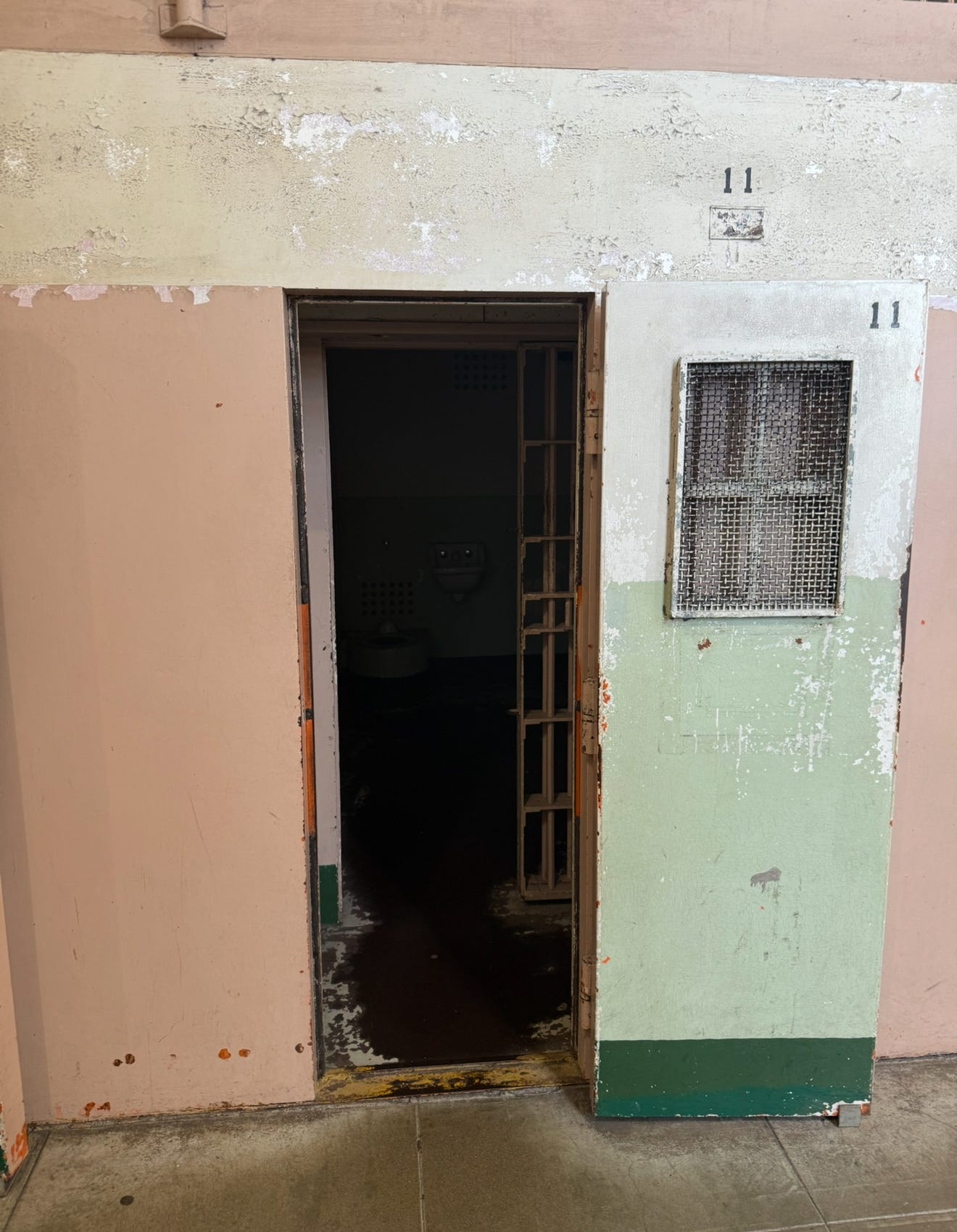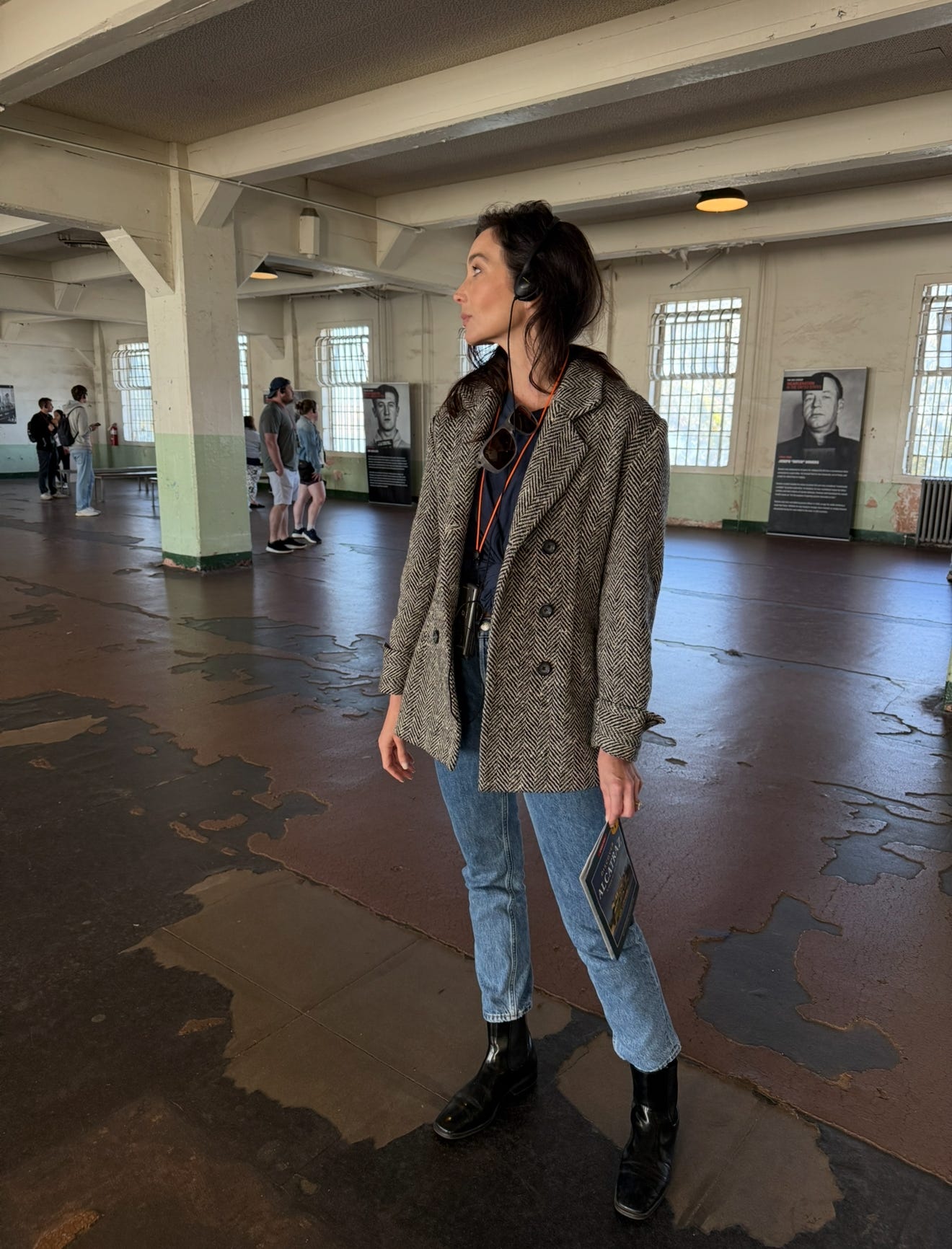Musings From Alcatraz
Isn't it funny how all the ways we try to escape eventually become the prison?
I’ve always been fascinated by dark historical places. Old prisons and insane asylums, haunted estates and abandoned desert towns, bloody battlegrounds and secret dungeons-these calamitous and dangerous energies have beckoned me to find them since I was a little girl.
I made up twisted ghost stories at fifth grade sleepovers and coaxed my little sister into exploring the ominous, musty crawlspace under our house in search of secret passageways and torture chambers. We could certainly analyze my morbid curiosities, maybe blame it on my Scorpio rising or my late mother’s penchant for the same creepy wonderings; I’m sure there’s a perfectly good explanation for it. Perhaps, those of us who’ve narrowly escaped death or public ridicule (or some other equally awful third thing) just love the kind of thrilling flirtation with the dark side that can only be experienced when standing on her hallowed grounds.
My husband and I visited Alcatraz last weekend in San Francisco, a bucket list spooky spot that is often referred to as The Rock on account of the prison being built on an island in the San Francisco Bay comprised of solid…rock. It’s an eerie sight, this monstrosity of cement and steel jutting up out of the water, looming in the distance, its heavy breathing pushing a dense fog over the light of the city.
We took a ferry from terminal thirty-three, only a twelve minute journey from port to port, and stepped off onto the same dock where nearly a hundred years ago infamous criminals like Al Capone and Machine Gun Kelley landed, presumably with far less enthusiasm. We were given headsets and chose our preferred language for the audio tour before following the signs up the steep and winding path, sea air whipping in our faces, to the cell house where we would step into the gruesome past, into the former prison once dubbed escape proof.
I was taken by the lightness. The walls, neutral-toned, mint green, rosy-taupe and alabaster, reflecting the sunlight pouring in through the row of skylights lining the high ceiling. A cruel reminder, like the city across the bay, that life was going on, that there was warmth somewhere out there.

Through my headphones, a former inmate recounted his experience, his commentary leading me down the corridor of 9x5 cells stacked three stories high. He told me about the routines and the rituals. He explained the codes and the hierarchy one must abide by to stay alive. To stay alive there were formulas and alliances, do’s and don’t’s, rules to follow; to survive, there was only one true lifeline-the movies. He wasn’t talking about cinema, no Clint Eastwood films or Marilyn Monroe windblown dresses; those were not allowed. He was talking about the movies he directed in his mind, the fantasy world he visited that kept him sane. Late at night, if you could focus long enough on the faintest pinprick of light seeping in through the top right corner of your cell where the ceiling met the steel door, if you could hold that vision long enough, the light would expand. First into a glowing orb, then into a television with moving, breathing characters and story.

Even in Alcatraz, an air-tight maximum security fortress, escape is possible with an active imagination and a commitment to completely suspend reality. My narrator explained the way he would design different images and scenes, the tiniest details were the most important. The color of a blouse, the pepper and garlic seasoning on the chicken skin, every fluttering leaf needed texture and hue. This was the only way to travel beyond the confines of the cold, steel bars and experience life while he was existing in hell. He simply could not spend his days being here, so he found a reliable way of going, if only for a moment, someplace else. Something started to sound familiar.
When I discovered alcohol’s ability to quickly transport me from an uncomfortable feeling to a less bothered, less activated state, I was probably around nineteen. It all started innocently enough as most bad habits do. A young girl’s way to establish her freedom, buck against the constraints of a broke twenty-something’s place in the world, and drown out heartbreak when the latest “love of her life” had disappointed. I wasn’t behaving much differently than the rest of my peers but I think I missed the memo explaining that I would need to evolve and develop some grown-up, healthier coping strategies. It became my escape of choice, my disappearing act. My singular solution to stress, insecurity, fear, and even overwhelming joy? Vanish.
I read once that some prisoners drop so much weight during incarceration not only to reveal muscle and appear more capable of defending themselves, but to create the illusion of more space in their tiny cells. They shrink to fit their environment, hoping a few extra inches might stave off claustrophobia. I’d been living as the incredible shrinking woman for decades before I got sober, adjusting my stature and the amount of space I was claiming for myself based on what the room could hold. The pieces of my personality that threatened to expose my lack of social savvy or unimpressive taste in music, carried off in a deluge of mezcal margaritas and Beaujolais.
Alcohol had a way of making my world painfully small. The square radius of the night defined by available transportation, the conversation stilted after a third cocktail and reduced to slurred philosophy or slapstick nonsense, my access limited to only those trapped in the same clown car. Still, even in these blurry vignettes of counterfeit connection- I’d fold into myself again, careful not to take up more square footage than I was allotted, offering “me” in a portion digestible to the crowd. This dishonest presentation left me feeling empty, like an aging con artist, a common criminal, tired and running out of schemes.
There were no petty criminals on Alcatraz. These were career fraudsters, homicidal maniacs, mob bosses, and kidnappers. Many ended up there because they’d so easily escaped from other prisons, too slippery to be trusted to stay put in less secure locations. Some did successfully serve their time and earn freedom, only to find themselves back in the system weeks, months, or years later. After a decade or more inside, reintroduction to society proved more difficult to navigate than the familiar hell of captivity. When we fail to learn new skills, we return to what we know.
So what happens when the escape becomes the prison? The trusty disappearing act, while offering momentary freedom, leaves one stuck in a different kind of bondage. We become beholden to the vessel that transports us out of this reality and into that one. The very thing that once liberated us from the constraints of pain or suffering or boredom or apathy becomes the very thing we cannot cut loose from. Without it we lose a piece of our identity, a false sense of safety, and a reliable way to Houdini ourselves out of discomfort. We imagine that deprived of some means to avoid the present we would certainly go crazy in the future; we’re going crazy nonetheless. We forget that not everyone lives this way, chained to an eject button, watching the clock tick down to the next opportunity to fly off into oblivion.
We are human and being human is undoubtedly difficult. Maybe we just replace one vice with another, over and over until we reach some mystery level of enlightenment either here or in the next realm. I am a seasoned escape artist, a fact I’ve come to terms with in recent years. I suppose I can turn almost anything into a way to evaporate from the here and now if I twist it round and round long enough. Just this afternoon I went out walking down the beach, Alcatraz somewhere behind the fog and the waves in the distance. Just me and my earbuds and some worn out sneakers, bouncing along with the sun claiming one side of my face and the wind claiming the other. I put on an album from 2023, just the opening three chords carrying me into a nostalgic melancholy. While it’s playing, every person I pass, each dog on a leash or bird in the sky exists within this container of memory and longing-my own dramatic illusory production. For approximately forty-four minutes I can live there and when it’s over, safely return to the here and now, no drink or drug required.
Maybe I’m not so different from inmate 4128, making use of what’s available to not go insane or revert back to old bad habits that become locked doors. Maybe I’m scratching on the door of enlightenment, maybe he’s swimming in the light.




Beautiful writing
This is a wonderful comparison that I hadn't considered when my sons and I were there 2 years ago. I've been sober for a few 24s now. Until I read this, I hadn't really considered just how isolated and imprisoned I had become over the years. Fortunately, I didn't need to try and navigate the waters of San Francisco Bay in my escape to a better life!
Alcatraz is an amazing place. I was actually there as a boy when the filming of the Eastwood movie was happening. To get back there with my sons almost 50 years later was a memorable experience. And San Francisco is a place I will always love. Such a gorgeous city, vibrant, historic, full of the blending of culture that makes our country so wonderful.
Great piece. Thanks for making me think!